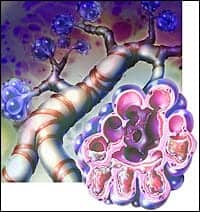Researchers have discovered a synthetic peptide that may help reduce excess fluid accumulation in lung transplant patients. The findings published in Critical Care Medicine showed that putting the TIP peptide into the trachea of rat lungs about a half hour before transplantation can nullify ischemic reperfusion injury and improve oxygenation.
A major potential problem immediately after lung transplantation is dysfunction of sodium channels in the alveoli, tiny air sacs where oxygen uptake occurs, impairing the sacs’ ability to clear fluid into the lymphatic system. Researchers also have noted an immediate invasion of white blood cells called neutrophils, which also produce reactive oxygen species.
Tumor necrosis factor (TNF), an inflammation-producing cytokine that helps the body fight infection, which can be deleterious, even deadly, at high levels, was implicated in these early problems. The lung transplant activates TNF production, causing cells that line the organ’s vasculature and air sacs to produce more reactive oxygen species and block sodium channels. Additionally, TNF has been found to have a polar opposite effect: blocking reactive oxygen species production and increasing sodium uptake. In the case of a lung transplant, however, the “bad” side is dominant, and that is where the synthetic TIP peptide can play a role.
When scientists gave the synthetic peptide to rats undergoing lung transplants, the good side prevailed. Levels of reactive oxygen species and neutrophils dropped and sodium channels rebounded.
Source: EurekAlert









